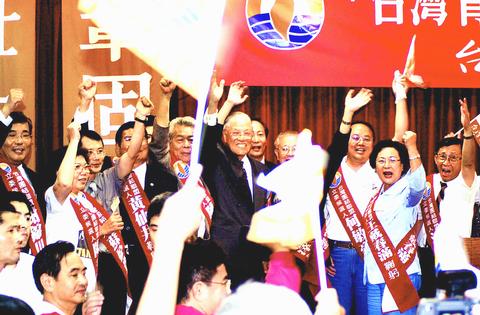Taiwan could learn a great deal about unity from the US and its response to last week's terrorist attacks, former president Lee Teng-hui (
"Look at the US. At its most difficult moment, members of the Congress, regardless of party affiliation, have all joined together. ... That is what a democratic country should be like," Lee told members of the Board of Industrial Park Manufacturers Federation at a luncheon yesterday.

PHOTO: HU WEI-MIN, TAIPEI TIMES
"Taiwan, on the other hand, is nothing like that," Lee said. "The lawmakers just act out skits like they are a part of some big drama and I have no idea what drama they think they are acting in. This type of behavior will only create fear and cause people to worry about our future.
"If you ask me, I am afraid for Taiwan's future," Lee said.
While President Chen Shui-bian (
"Some parties and some people are purposely pulling President Chen down to see whether he will collapse. What kind of attitude is that?" Lee asked.
"The only thing that these politicians dream about is getting back their power and becoming the next president. While Taiwan is in economic recession we cannot allow this chaos to continue."
Yesterday's luncheon was arranged by Huang Tzung-yuan (黃宗源), president of the manufacturers' association, and the Taiwan Solidarity Union.
DPP candidate for Taichung City Mayor Tsai Ming-hsien (蔡明憲) was also in attendance.
Lee also defended his "no haste, be patient" policy yesterday, responding to recent comments made by Formosa Plastics tycoon Wang Yung-ching (
Lee said the policy had its time and purpose, but it wasn't responsible for driving Taiwan's economy into its current quagmire as Wang had claimed.
"The policy was made to help protect Taiwan's high-tech and infrastructure industries. Under the `no haste, be patient' policy, Taiwan's economic growth was stable and people were still making money," Lee said.
Lee also said he wasn't opposed to investment in China.
"I am not opposed to people making money in China. I encourage businessmen to make money everywhere in the world, but to be careful," Lee said.
He did, however, take issue with the government's timing of relaxing restrictions imposed by the policy, which limits investments to US$50 million and bans certain types of investments in China.
"The problem is that now -- at a time when you need blood -- you are still drawing blood and giving it to someone else," Lee said.
"The only thing that we can count on is China's cheaper labor. However, labor salaries will rise in China in the near future and they will experience the same problems Taiwan is experiencing right now.
"Taiwan should focus on improving our infrastructure industries and improving our investment environment rather than just moving our roots to China," he said.

MAKING WAVES: China’s maritime militia could become a nontraditional threat in war, clogging up shipping lanes to prevent US or Japanese intervention, a report said About 1,900 Chinese ships flying flags of convenience and fishing vessels that participated in China’s military exercises around Taiwan last month and in January last year have been listed for monitoring, Coast Guard Administration (CGA) Deputy Director-General Hsieh Ching-chin (謝慶欽) said yesterday. Following amendments to the Commercial Port Act (商港法) and the Law of Ships (船舶法) last month, the CGA can designate possible berthing areas or deny ports of call for vessels suspected of loitering around areas where undersea cables can be accessed, Oceans Affairs Council Minister Kuan Bi-ling (管碧玲) said. The list of suspected ships, originally 300, had risen to about

DAREDEVIL: Honnold said it had always been a dream of his to climb Taipei 101, while a Netflix producer said the skyscraper was ‘a real icon of this country’ US climber Alex Honnold yesterday took on Taiwan’s tallest building, becoming the first person to scale Taipei 101 without a rope, harness or safety net. Hundreds of spectators gathered at the base of the 101-story skyscraper to watch Honnold, 40, embark on his daredevil feat, which was also broadcast live on Netflix. Dressed in a red T-shirt and yellow custom-made climbing shoes, Honnold swiftly moved up the southeast face of the glass and steel building. At one point, he stepped onto a platform midway up to wave down at fans and onlookers who were taking photos. People watching from inside

Japan’s strategic alliance with the US would collapse if Tokyo were to turn away from a conflict in Taiwan, Japanese Prime Minister Sanae Takaichi said yesterday, but distanced herself from previous comments that suggested a possible military response in such an event. Takaichi expressed her latest views on a nationally broadcast TV program late on Monday, where an opposition party leader criticized her for igniting tensions with China with the earlier remarks. Ties between Japan and China have sunk to the worst level in years after Takaichi said in November that a hypothetical Chinese attack on Taiwan could bring about a Japanese

The WHO ignored early COVID-19 warnings from Taiwan, US Deputy Secretary of Health and Human Services Jim O’Neill said on Friday, as part of justification for Washington withdrawing from the global health body. US Secretary of State Marco Rubio on Thursday said that the US was pulling out of the UN agency, as it failed to fulfill its responsibilities during the COVID-19 pandemic. The WHO “ignored early COVID warnings from Taiwan in 2019 by pretending Taiwan did not exist, O’Neill wrote on X on Friday, Taiwan time. “It ignored rigorous science and promoted lockdowns.” The US will “continue international coordination on infectious